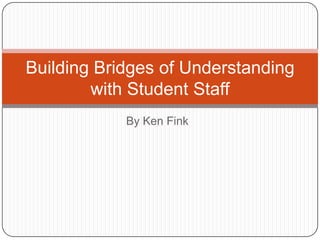
Building Bridges
- 1. By Ken Fink Building Bridges of Understanding with Student Staff
- 2. What I am presenting What you are going to walk away with today is: A better understanding of how to assist your staff members through changes in their lives How to support transitions More understanding to help you develop your staff into a team Knowing a student development theory about transition http://www.youtube.com/watch?v=uZ4MkSgCZhc
- 3. Building Bridges When building a bridge there are 4 main elements Architect/designer Resources Time Upkeep What is the number 1 constituent while using a bridge? Trust the methods and models of student development
- 4. BUILD! Breakdown walls Upload ideas, resources, and regulations Implement ideas, resources and regulations Learn from mistakes and struggles Determined to keep moving forward
- 5. Who is Dr. Nancy K. Schlossberg? Education & Employment B.A. Sociology (1951) from Bernard College Ed.D. Counseling (1961) from Teachers College, Columbia University Professor Emeritus at the University of Maryland in the Dept of Counseling and Personnel Services Faculty member of Wayne State University, Howard University, and Pratt University “She is an expert in the areas of adult development, adult transition, career development, adults as learners, and intergenerational relationships”(Mid Atlantic Career Counseling Association website, February 22, 2002) Was the first woman executive at the American Council on Education, where she established the Office of Women in Higher Education (1973). Past President of the National Career Development Association (NCDA) and NASPA’s “Outstanding Contribution to Literature or Research Award” Currently the President of a consulting group, Transition Works. (Schlossberg, p. 2-18)
- 6. Dr. Schlossberg’s Transition Theory A transition can be said to occur if an event or non-event results in change in assumptions about oneself and the world and thus requires a corresponding change in one’s behavior and relationships. A transition exists only if it is so defined by the individual experiencing it. Is typically categorized as a theory of adult development. Fits in the psychosocial category because it examines individuals personal and interpersonal lives. This theory could also be categorized as a person-environment theory, because the environment is a very influential variable. (Gelardin, 2007)
- 7. Students becoming staff The transition process: (Schlossberg, p. 2-18)
- 9. On a 1-10 scale, how negative or positive is it? (is it good or bad?)
- 10. What is its timing? (worst or best possible time in my life?)
- 11. How long is there to absorb its impact? (time commitment?)
- 12. Is there anything positive about it? (what am I going to learn from this?)
- 13. How much control can I exert over it? (do I have choices? Freedom?)
- 14. Is it temporary or long in duration? (investment?)(Schlossberg, p. 2-18)
- 15. Self Gender, age, ethnicity, socioeconomic status, values, experience and outlook Do I see the glass as half empty or half full? Do I believe that I can exert control? (what am I responsible for?) Have I had past successful experience with change? (job, career?) Do I know how to cope by using humor, relaxation, exercise, meditation etc.? (how do I respond) What internal resources do I bring? What do I need for me? (Schlossberg, p. 2-18)
- 16. Support People, departments, financial capability. Do I have friends and family who care and who are willing to help me? Does my supervisor care? Am I willing to ask for help or develop a network of supporters? Are there departments that can help? Are there sufficient material resources? (Schlossberg, p. 2-18)
- 17. Strategies Needed for adapting to new situations and managing the new stresses. Peer mentors? Hall Director? Counseling? Advisors? Stress coping strategies? (Schlossberg, p. 2-18)
- 18. Bridges and Transitions? To better understand what your student staff is going through we must look at what they are going through, what affect and impact the transition of student to a student staff member has on them personally. As supervisors, we need to see the personal impact of being a student staff member so that we can build the best bridge possible between ourselves and our staff and our staff amongst itself.
- 19. Case Studies Breakdown walls Upload ideas, resources, and regulations Implement ideas, resources and regulations Learn from mistakes and struggles Determined to keep moving forward Self Situation Support Strategies
- 20. Quotes “People are lonely because they build walls instead of bridges.” “The only bad thing about burning your bridges behind you is that the world is round.” "Don't burn bridges. You'll be surprised how many times you have to cross the same river." “Education is all a matter of building bridges.” (Bridges of quotes ,2006)
- 21. References Bridges of quotes (2006). Retrieved December 22, 2008 from http://thinkexist.com/quotes/with/keyword/bridges/ Evans, N. J., Forney, D. S., Guido-DiBrito, F. (1998). Student development in college:Theory, research, and practice. San Francisco, CA: Jossey-Bass Publishers. Gelardin, S (2007). Lifework planning services: make your dreams your lifework. Retrieved on December 22, 2008 from http://lifeworkps.com/gcdf/weblog/3095.html Schlossberg, N. K. (1981). A model for analyzing human adaptation to transition. Counseling Psychologist, 9(2), 2- 18. Throwing Toasters (2007). The ra song. Retrieved on January 20, 2009 from http://www.youtube.com/watch?v=uZ4MkSgCZhc